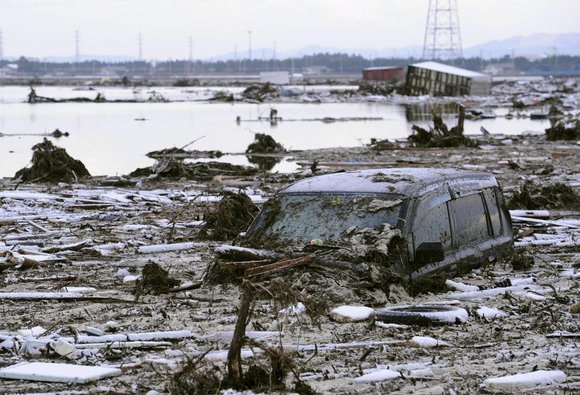Japanese Earthquake Likely To Disrupt Auto Industry Around The World

While other car blogs interrupt their reporting to show gratuitous pictures from the massive earthquake in Japan, TTAC stays on topic. Even in this confused state, there are better sources for real-time information on the catastrophe in Japan than armchair car bloggers.
“The devastating earthquake that hit eastern Japan Friday will likely deal a severe blow to the nation’s overall economy, as that section of the country serves as a major hub for automobile, autoparts, energy and materials industries,” The Nikkei [sub] reports. The world’s auto industry has barely begun to recover. The disaster in Japan could have a major impact.
While having live news of the evacuation around two nuclear power plants in one ear, here the situation of the auto plants according to the latest news.
- Nissan immediately halted production at its five plants in the Tohoku and Kanto regions, which absorbed the brunt of the earthquake. Nissan said today it will suspend production at all of its six production facilities in Japan. In the meantime, Nissan will “assess the damage to our facilities and equipment, as well as discuss parts delivery with our suppliers.” Small fires broke out at its Tochigi and Iwaki plants but have been extinguished.
- Toyota Motor Corp. immediately had to shut down two factories situated in the hardest hit area. Workers at the plants in Iwate prefecture and in Miyagi prefecture have been evacuated. The situation there is unknown. On Saturday, Toyota said it will keep all of its 12 domestic plants closed on Monday. This to allow employees and parts suppliers to check the safety of their families. When to resume operations will be decided Monday, The Nikkei [sub] says.
- Honda decided to suspend four of its five domestic plants Monday. Honda will halt operations at its plants in Tochigi, Sayama, Hamamatsu and Suzuka. One of its workers died at its Tochigi Research and Development Center when a wall collapsed in a cafeteria. More than 30 Honda employees were injured in Tochigi area from collapsing ceilings.
- All five of the auto assembly and parts plants for Subaru brand vehicles halted operations.
The earthquake “threatens to crimp U.S.-bound exports of Japanese vehicles and parts in coming months, straining an already stretched supply base in the recovering industry,” Reuters says. All major ports in Japan were shut on Friday. Supply routes in Japan are blocked or severely degraded. There are massive power outages.
Many overseas manufacturing and assembly plants rely on kits and parts from Japan.
The restructuring has stretched suppliers around the world “so thin that even relatively minor disruptions can force wide shutdowns of auto assembly plants,” Reuters says.
If a volcano in Iceland can stop the lines in the U.S. and Europe, try to imagine what a serious hit to Japan’s industrial base can do. Just as a for instance, 40 percent of the world supply of flash memory chips comes from Japan. Japan supplies 24 percent of the global semiconductor market, according to data from U.K.-based semiconductor market research firm Future Horizons.
Another example: Autoliv, the world’s biggest producer of car safety products such as seatbelts and airbags, halted production at one of its three Japanese plants. The affected plant was shut due to damage to infrastructure, says the Wall Street Journal.
Both troubled Fukushima reactors are close to auto plants by Toyota, Nissan, Honda and many parts suppliers.
To get somewhat of an idea of the degree of destruction, look at these before and after pictures, provided by ABC News. Many are from Sendai and the surrounding Miyagi prefecture, where more than 10,000 are feared to have died.
Just a few weeks ago, we had been there for the opening of Toyota’s Ohira plant.
A CBS team is trying to get from Tokyo to Sendai, a 200 mile trip that normally takes 4-5 hours by car and less than 2 by train. 15 hours later, they still weren’t there.
It becomes obvious that it will be a while until Toyota’s Ohira plant will be shipping Yaris cars to the U.S. again.

Bertel Schmitt comes back to journalism after taking a 35 year break in advertising and marketing. He ran and owned advertising agencies in Duesseldorf, Germany, and New York City. Volkswagen A.G. was Bertel's most important corporate account. Schmitt's advertising and marketing career touched many corners of the industry with a special focus on automotive products and services. Since 2004, he lives in Japan and China with his wife <a href="http://www.tomokoandbertel.com"> Tomoko </a>. Bertel Schmitt is a founding board member of the <a href="http://www.offshoresuperseries.com"> Offshore Super Series </a>, an American offshore powerboat racing organization. He is co-owner of the racing team Typhoon.
More by Bertel Schmitt
Latest Car Reviews
Read moreLatest Product Reviews
Read moreRecent Comments
- Jalop1991 is this anything like a cheap high end German car?
- HotRod Not me personally, but yes - lower prices will dramatically increase the EV's appeal.
- Slavuta "the price isn’t terrible by current EV standards, starting at $47,200"Not terrible for a new Toyota model. But for a Vietnamese no-name, this is terrible.
- Slavuta This is catch22 for me. I would take RAV4 for the powertrain alone. And I wouldn't take it for the same thing. Engines have history of issues and transmission shifts like glass. So, the advantage over hard-working 1.5 is lost.My answer is simple - CX5. This is Japan built, excellent car which has only one shortage - the trunk space.
- Slavuta "Toyota engineers have told us that they intentionally build their powertrains with longevity in mind"Engine is exactly the area where Toyota 4cyl engines had big issues even recently. There was no longevity of any kind. They didn't break, they just consumed so much oil that it was like fueling gasoline and feeding oil every time



































Comments
Join the conversation
Here's a press release from Suzuki: http://media.suzuki.com/auto/index.php?p=787&pr=359
From AFP: "Mitsubishi said it would halt production at all three of its domestic plants on Monday and Tuesday. Suzuki motors also said it was suspending all domestic plant operations Monday."